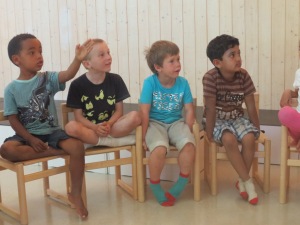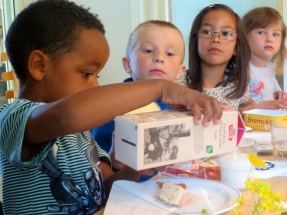 Not only can we do philosophy with very young children but we must do it for it is the evidence that we are listening and respecting children’s dialogues.
Not only can we do philosophy with very young children but we must do it for it is the evidence that we are listening and respecting children’s dialogues.
I visited Maaike Lahaise, the Director of skrubbelund barnehage (scrubland preschool), a government owned, Reggio Emilia inspired centre of 70 children and 18 adults with the children in three groups – 1-3 years, 3 to 4 years and 5. Maaike ‘caught the passion’ for philosophy after seeing it in action and has now pioneered this in the centre where she is responsible not only for the centre but also for those children who will start formal school within a year.
I was so warmly welcomed with hellos, high 5’s and a smattering of English words from her class of 4 to 5 year olds. A small group of girls delegated themselves as my minders – one to carry the notebook, one the pen and one my camera and off we went to explore their outdoor area.
 Of particular note was the amazing confidence the children had with me, the stranger who could not speak, and how quickly they accommodated me. Charlie (4) offered to take my photo with two of my new friends.
Of particular note was the amazing confidence the children had with me, the stranger who could not speak, and how quickly they accommodated me. Charlie (4) offered to take my photo with two of my new friends.
We are a family, said Maaike, and the children are free to go into any space including the teacher’s spaces.
Prior to the philosophy lesson, we all sat together to get to know each other and shared a meal – homemade bread, cheeses, meats, spreads water and milk.
 M: Kate, do you want to say something before we eat?
M: Kate, do you want to say something before we eat?
K: Yes. I want to say thank you for letting me visit, thank you for the food and thank you for being so friendly.
M: Does anyone else want to say something?
C: That’s what we do at home but we talk about Jesus too.
And so a conversation began even before the bread was broken and I realised we were in a community of inquiry.
C: Hmmm this looks good so it must taste good
M: Can something look good and not taste good?
C: No. Everything looks bad if I’ve not tasted it, but when I know what it tastes like then it looks good.
M: Is there a difference between food that looks good and food that looks bad?
C: Yes something might look good but taste bad
M: Can you give me an example?
C: Well the food the Sami people eat looks bad like blood pancakes but they taste good. I saw that in a video.
At this point the milk ran out and Maiike asked a child if he could get another carton.
 C: No. Someone else can get it.
C: No. Someone else can get it.
M: Are you not able to get it or don’t you want to get it?
C: I have a sore leg
M: Does Benjamin not want to get it or he can’t get it?
More discussion and as most agreed that he didn’t want to get it but one child. Then a child who had not spoken aloud said,
C: But if he does have a bad leg then he can’t get it.
Later.
M: Okay everyone; in five minutes we can go to have a group chat. Is that a long time or a short time?
And so the discussion continued – even before we had commenced the formal ‘philosophy lesson’.
I considered the point often made by teachers that there is no ‘time’ to do philosophy but that is when philosophy is viewed as a ‘subject’. With young children it is a particular style of conversation – a collaborative conversation between children guided by teachers. To do this, teachers need support on how to recognise the philosophic moves that Maaike does and how to extend the dialogue by giving children practice in thinking skills (giving reasons, giving examples, counter examples, suggestions, conclusions, examples).
It’s actually very simple said Maaike, we must listen to the children. I am a learner too and I learn much from engaging in dialogue with them.
I recalled reading a statement by another outstanding early years practitioner, Sara Stanley in But Why.
You do not have to be a ‘super teacher’ to do P4C – Philosophy for children. You only have to be prepared to value what children have to say, to respect the questions they ask and to provide them with opportunities to develop their thinking.
 After lunch (which the children cleared up) we went into an adjacent room used for shared talk and drama. Maaike told the children they were going to see a film about animals. At the first frame one child commented.
After lunch (which the children cleared up) we went into an adjacent room used for shared talk and drama. Maaike told the children they were going to see a film about animals. At the first frame one child commented.
C: But we must have a film in English so Kate can understand it – we know Norwegian and a little English but she knows no Norwegian only English
And from this a discussion began on how we communicate, whether animals can talk to each other, whether animals can they talk at all, whether we could learn an animal language, whether parrots are really talking? and so it went on again. All in Norwegian but I was able to be understood because children use a variety of ways to communicate if you just listen and watch.
What I have taken away is that
- Philosophy is everywhere, and even children as young as two can engage in it. I recall a recent conversation by Pip, just two, when asked what should they do next. We have to go to the movies Daddy because the red teddy said so (reason giving) and she will be sad if we don’t.
- Philosophy is not difficult if you listen to children and are trained to make the philosophic moves through questioning.
But is it Philosophy?
I would say yes because Philosophy is a method of thinking, a learned skill just like reading and writing. Children have ideas and questions about contestable and abstract concepts and within the collaborative environment and with a skilled facilitator, they can explore them and deepen their understandings.
Reading:
Sara Stanley, But Why? Developing Philosophic Thinking in the Classroom.

The multiple-perspective of philosophy allows tolerance and multi-views enhances respect for others and encourage to take decision that suits them. So children should be treated with philosophical questions and answer with serious fun.
LikeLike
Dear Kate! First today I read your nice report of your visit in Skrubbelund barnehage. I got so proud listening once again to the comments of my children. They really were in the thinking mood. And I’m sure you too, with your kind, honest and interesting attitude, inspired the children to open their minds for us. I’m so greatful you paid us that visit. It was a gold-rimmed moment!
I wish you good luck with your work and of course: a cosey Christmas and a fantastic New Year!
❤ Maaike
LikeLike